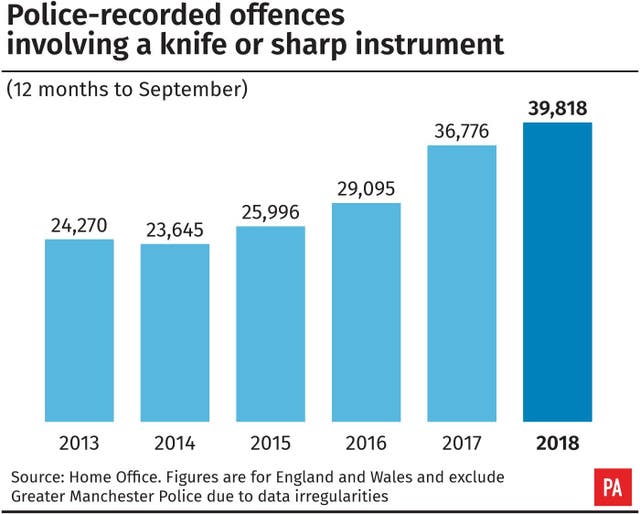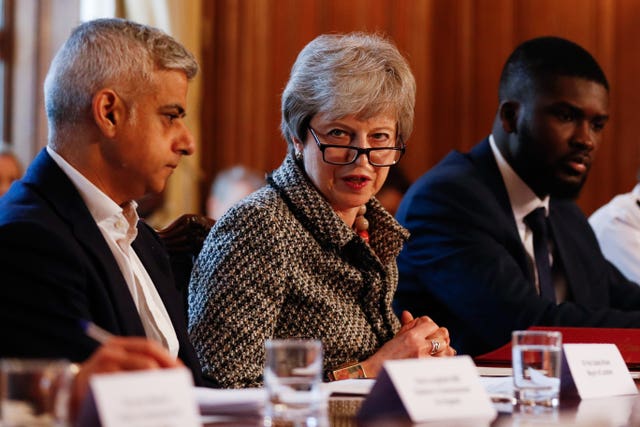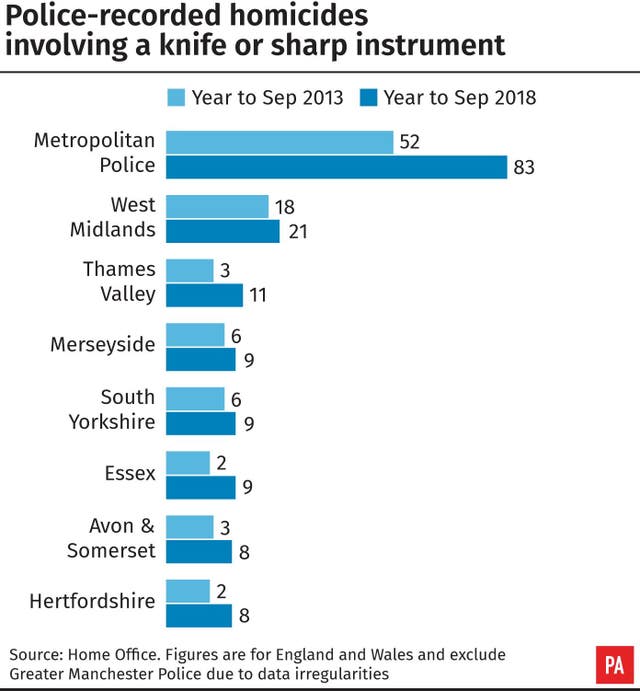Police officers, teachers and nurses have criticised Government proposals that could make them accountable for failing to “spot warning signs” of violent crime among young people.
The Prime Minister warned “we cannot simply arrest ourselves” out of the country’s knife crime crisis as she opened a summit in Downing Street on Monday.
More than 100 experts are meeting this week after Home Secretary Sajid Javid floated the idea of a so-called “public health duty” intended to help spot the warning signs that a young person could be in danger, “such as presenting in A&E with a suspicious injury, to worrying behaviour at school or issues at home”.
A consultation in England and Wales will assess the extent to which those on the front line will be held to account for failing to prevent a young person getting involved in violence, a Home Office spokesman said.
The proposals are similar to the successful approach taken in Scotland, where knife crime has been treated as a public health issue for more than a decade, with a significant reduction in stabbings in Glasgow.
Opening the serious youth violence summit on Monday, Theresa May said: “Of course we will always make sure that the resources and tools are there to be able to apprehend and deal with those who are carrying and using knives and that the police have what they need to do.
“But we cannot simply arrest ourselves out of this problem. This is a wider problem, it is more deep-seated and we have to have a more coordinated effort.”
The Prime Minister met with the families of knife crime victims as well as experts including Met Police Commissioner Cressida Dick, Patrick Green from the Ben Kinsella Trust, and Baroness Newlove, the Victims’ Commissioner for England and Wales, whose husband Garry was beaten to death by a gang vandalising his car in 2007.

Speaking after attending the summit, John Apter, the national chair of the Police Federation for England and Wales, said he was “cynically optimistic”, but added that the Government should take responsibility for policies that have left public services “stripped to the bone” and police “firefighting” when it comes to dealing with crime.
Mr Apter, who represents rank-and-file officers, said: “Whilst I fully accept we have to look forward, I think the Government and the Prime Minister in particular has to shoulder some of the responsibility for the Government’s failed policies. What she’s done to policing is unforgivable and she’s now seeing the impact of that.”
He also described proposals which could make police, along with teachers and nurses, accountable for failing to spot warning signs that youngsters are becoming involved in knife crime as “a bit of an insult”.
“We already have that level of accountability and we already highlight if we fear that somebody is going down that path,” he said.
“My plea is that this cannot be just a talking shop or a photo opportunity.
“It’s got to be something meaningful and credible because the country deserves something to come out of this.”

Others have also suggested the proposals could put greater pressure on frontline staff.
Royal College of Nursing acting chief executive and general secretary Dame Donna Kinnair said: “With almost 40,000 nursing vacancies in England alone, nurses are already concerned about providing safe and effective care with such widespread staff shortages.
“Nursing staff already have a key role in safeguarding patients, whether that’s working in the community, in schools or in hospitals and it’s unclear how putting a further obligation on our members, already working incredibly hard to do all they can for patients, will prevent violent crime.”
Dr Mary Bousted, joint general secretary of the National Education Union, said: “Neither the blame for or the solution to violent crime can be laid at the door of schools or frontline hospital staff.
“Schools already have strong safeguarding practices in place and staff will be alerted to any issues of concern.
“The problem is what happens after issues of concern have been identified.
“Schools have lost pastoral support, special needs teachers and school counsellors.”
It comes a day after Mr Javid, who is also attending the summit, granted police new powers to increase stop and search activity following a spate of bloodshed across London and the rest of England since the start of 2019.

“Violent crime is like a disease rotting our society and it’s essential that all public bodies work together to treat the root causes,” he said.
“The public health, multi-agency approach has a proven track record and I’m confident that making it a legal duty will help stop this senseless violence and create long-term change.”
It follows days of violence across the country, including a slew of serious stabbings in Edmonton, north London, from Saturday night into Sunday morning, as well as the death of a 40-year-old motorist at the wheel of his vehicle in Clapham, south-west London, and a 29-year-old fatally stabbed on Thursday afternoon in Toxteth, Liverpool.
There were 285 homicides where the method of killing was by a knife or sharp instrument in the year to March 2018 – the highest number since records started in 1946.
Mrs May came under fire last month after she suggested that police cuts were not to blame for a spate of fatal stabbings on teenagers.
Senior figures in policing were at odds with the Prime Minister as they called for a reverse to slashes in staffing levels.
In our latest blog, @MHewittNPCC reflects on what his priorities are in his new role as NPCC Chair, including how extra money should be used in the short term to combat the rise in violence that is claiming young lives https://t.co/qUOzsRdLyS pic.twitter.com/YgG4hkeWvX
— NPCC (@PoliceChiefs) April 1, 2019
One of those attending the summit, Martin Hewitt – the new chair of the National Police Chiefs’ Council, wrote in a blog post: “This year there will be £970 million more for policing than the previous year – that is positive but it’s not enough to meet all the challenges that the service faces.
“So an important part of my role will be working with policing and crime commissioners and the Home Office to make an evidence-based case for increased investment in the forthcoming government spending review as well as developing ambitious plans to maximise every penny we have.”
The consultation, mooted by Mr Javid in the Commons four weeks ago, will open on Monday until May 28 to the public and professionals across the UK.
